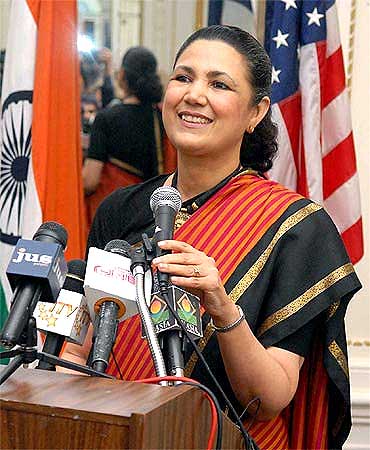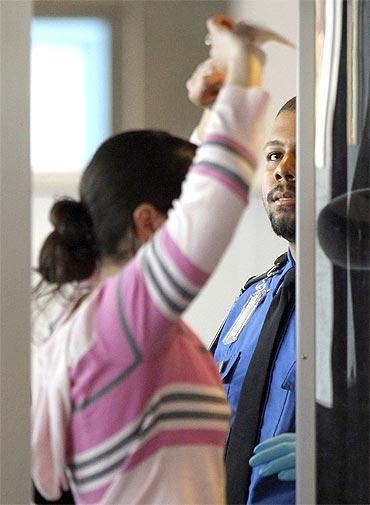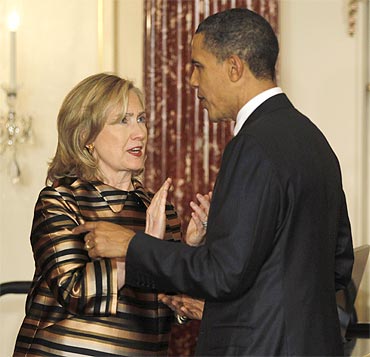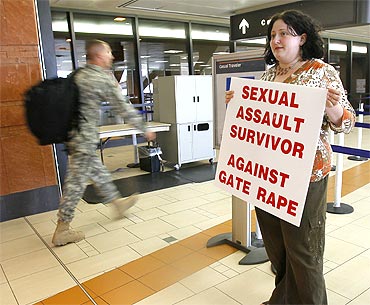
In the first incident reported on December 4, Meera Shankar, the Indian ambassador to the US, was subjected to a pat-down body search at an airport in Mississippi, even after her diplomatic status had been revealed. She had been picked out of a security line at the Jackson-Evers International Airport reportedly because she was wearing a sari. She was taken to a separate room and searched.
...

There was a similar incident, about two weeks ago, in which Hardeep Puri, the Indian ambassador to the United Nations based in New York, was reportedly asked to remove his turban at an airport in Houston, Texas.
When he refused to do so, he was detained in a "holding room" for about 30 minutes and was allowed to leave after a Transportation Security Administration official intervened. He reportedly declined to allow the security officials to subject him to a pat-down body search.

A pat-down search means patting the entire body from head to foot in order to see whether there is any concealed object attached to the body. The procedures provide for a pat down of even genitals and breasts. Under new security procedures introduced earlier this year, airline passengers are required to undergo either a full body scan by an X-ray machine or a manual pat-down search. Anyone refusing to agree to one of them cannot board an aircraft.
This procedure was introduced after an incident on December 25,2009, in which a Nigerian student trained by Al Qaeda in Yemen tried unsuccessfully to blow up a US plane over Detroit. He had concealed an improvised explosive device in his underwear and taken advantage of the fact that at the Amsterdam airport where he boarded the plane there was no full body scanner at the departure gate through which he boarded. Nor was there a provision for a pat-down search.

The introduction of the new procedure in the US has come in for criticism from the travelling public in the US. According to the BBC, US President Barack Obama has reportedly told the TSA, "You have to constantly refine and measure whether what we're doing is the only way to assure the American people's safety."
The BBC has also quoted Hillary Clinton, the US secretary of state, as stating that she would not submit to a security pat down "if I could avoid it". She added that everyone, "including our security experts, are looking for ways to diminish the impact on the travelling public" and that "striking the right balance is what this is about".
Robert Gibbs, the White House press spokesman, has said that the US airport security agency is "desperately" working to balance travellers' privacy concerns with security needs.
TSA head John Pistole said in an interview to ABC that there would be no short-term changes, but added, "What I'm doing is going back and looking at, are there less invasive ways of doing the same type of screening?"
These remarks by Obama, Clinton and other officials were in response to the criticism from the US travelling public and not in response to the protests from the government of India over the two incidents mentioned above.

The response to the Indian protests has been typical with the state department expressing its concern over the incident relating to Meera Shankar, but US Homeland Security Secretary Janet Napolitano saying that the pat-down search had been "appropriate".
These incidents draw attention once again to the differences that continue to prevail in the US between the state department and the homeland security department over courtesies to be extended to diplomats and visiting foreign dignitaries.
While the state department opposes such courtesies being sacrificed in the interest of security, the homeland security department sticks to its position that the security of all passengers is paramount and that if a diplomat is to be subjected to the same procedures as others, so be it.
It remains to be seen whether there will be any improvement in the position in future as a result of the Indian protests. The conflict over diplomatic courtesies between foreign offices and the security agencies is a global phenomenon.
In Israel, there was a similar incident in 2007, when a senior British woman diplomat was subjected to body search by the Shin Bet security guards when she went to the prime minister's office.

Public outrage in India over the US humiliation to Indian diplomats has led to demands for a tit-for-tat policy. This could become counter-productive and lead to a messy situation.
Presently, the instructions to our Central Industrial Security Force, which is responsible for airport security, is to treat all foreign diplomats -- junior or senior -- and visiting foreign dignitaries with courtesy. As a result, India enjoys the reputation of treating foreign diplomats and dignitaries with the courtesies they are entitled to under the Vienna convention.
If we make an exception in the case of US diplomats and authorise the CISF to subject them to body searches under the rule of reciprocity of treatment, we may find it difficult to control the CISF if they adopt these procedures in the case of diplomats of other countries too.